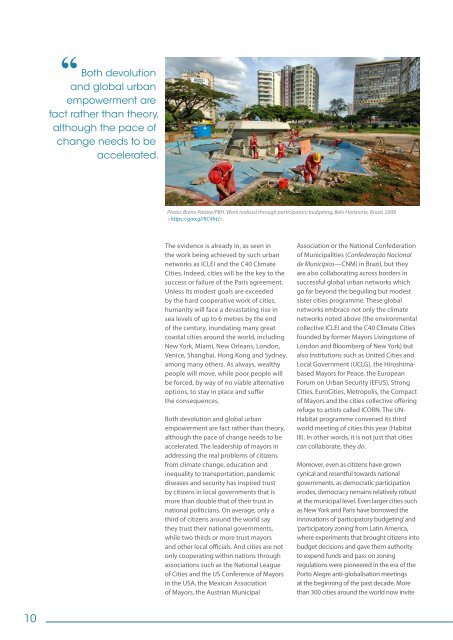A new urban paradigm pathways to sustainable development
PiF37
PiF37
Create successful ePaper yourself
Turn your PDF publications into a flip-book with our unique Google optimized e-Paper software.
“<br />
Both devolution<br />
and global <strong>urban</strong><br />
empowerment are<br />
fact rather than theory,<br />
although the pace of<br />
change needs <strong>to</strong> be<br />
accelerated.<br />
Pho<strong>to</strong>: Breno Pataro/PBH. Work realised through participa<strong>to</strong>ry budgeting, Belo Horizonte, Brazil, 2008<br />
.<br />
The evidence is already in, as seen in<br />
the work being achieved by such <strong>urban</strong><br />
networks as ICLEI and the C40 Climate<br />
Cities. Indeed, cities will be the key <strong>to</strong> the<br />
success or failure of the Paris agreement.<br />
Unless its modest goals are exceeded<br />
by the hard cooperative work of cities,<br />
humanity will face a devastating rise in<br />
sea levels of up <strong>to</strong> 6 metres by the end<br />
of the century, inundating many great<br />
coastal cities around the world, including<br />
New York, Miami, New Orleans, London,<br />
Venice, Shanghai, Hong Kong and Sydney,<br />
among many others. As always, wealthy<br />
people will move, while poor people will<br />
be forced, by way of no viable alternative<br />
options, <strong>to</strong> stay in place and suffer<br />
the consequences.<br />
Both devolution and global <strong>urban</strong><br />
empowerment are fact rather than theory,<br />
although the pace of change needs <strong>to</strong> be<br />
accelerated. The leadership of mayors in<br />
addressing the real problems of citizens<br />
from climate change, education and<br />
inequality <strong>to</strong> transportation, pandemic<br />
diseases and security has inspired trust<br />
by citizens in local governments that is<br />
more than double that of their trust in<br />
national politicians. On average, only a<br />
third of citizens around the world say<br />
they trust their national governments,<br />
while two thirds or more trust mayors<br />
and other local officials. And cities are not<br />
only cooperating within nations through<br />
associations such as the National League<br />
of Cities and the US Conference of Mayors<br />
in the USA, the Mexican Association<br />
of Mayors, the Austrian Municipal<br />
Association or the National Confederation<br />
of Municipalities (Confederação Nacional<br />
de Municípios—CNM) in Brazil, but they<br />
are also collaborating across borders in<br />
successful global <strong>urban</strong> networks which<br />
go far beyond the beguiling but modest<br />
sister cities programme. These global<br />
networks embrace not only the climate<br />
networks noted above (the environmental<br />
collective ICLEI and the C40 Climate Cities<br />
founded by former Mayors Livings<strong>to</strong>ne of<br />
London and Bloomberg of New York) but<br />
also institutions such as United Cities and<br />
Local Government (UCLG), the Hiroshimabased<br />
Mayors for Peace, the European<br />
Forum on Urban Security (EFUS), Strong<br />
Cities, EuroCities, Metropolis, the Compact<br />
of Mayors and the cities collective offering<br />
refuge <strong>to</strong> artists called ICORN. The UN-<br />
Habitat programme convened its third<br />
world meeting of cities this year (Habitat<br />
III). In other words, it is not just that cities<br />
can collaborate, they do.<br />
Moreover, even as citizens have grown<br />
cynical and resentful <strong>to</strong>wards national<br />
governments, as democratic participation<br />
erodes, democracy remains relatively robust<br />
at the municipal level. Even larger cities such<br />
as New York and Paris have borrowed the<br />
innovations of ‘participa<strong>to</strong>ry budgeting’ and<br />
‘participa<strong>to</strong>ry zoning’ from Latin America,<br />
where experiments that brought citizens in<strong>to</strong><br />
budget decisions and gave them authority<br />
<strong>to</strong> expend funds and pass on zoning<br />
regulations were pioneered in the era of the<br />
Por<strong>to</strong> Alegre anti-globalisation meetings<br />
at the beginning of the past decade. More<br />
than 300 cities around the world now invite<br />
10


